BODY OF CHRIST, the Season has changed. Be very circumspect. We’re hanging by a thread in this special time.
This Relates to “Nice Christian” Witchcraft
Usually do ONLY to MINI MEGA SHEKEL U PHARISEE .
And I know that I trigger it.( FOR SHOWING UP)
Prophetic Paranoia “I was looking back to see, who was looking back at me” started understanding this in late 1990’s Florida . And I appear to trigger it among All White Good Boyism. Instead of wasting time, I studied it back and Bible scriptures to deliver it.
And old Pentecostal preacher once said, “Never be afraid if/when a demon starts to manifest. It’s a sign that it’s READY TO COME OUT.”…. And so it be …RIGHT NOW!

SERVING TWO MASTERS. “They love one but hate the other, hate the other but love the one” Christ
Comment: “We KNOW what they’re doing, but they don’t realize it. Why should we TRUST THESE? HOW CAN WE? WHY SHOULD WE?” T.D’Arcy Leadership (hoping to repopulate these styles of churches, persons, families) “These often bear the fruit of SELF PROTECTING NO SPINE, JUDGEMENTAL FAULT FINDING (ALSO TEMPERAMENTAL) NEW WHINE”
MY OWN LIFE EXPERIENCE (From certain relatives, poor me ministry/business groups): My own 40-year recurring discovery has been that it wants to OWN US, KEEP US submitted to white witchcraft legalism. It’s a major fruit of the Western European Levitical Patriarchal, Matriarchal Colonial (WELP Pride) “Submissionite” system—the patriarchy, which may be nearly purely white (but could involve any race in this “spirit”). This is a big governing culture where the spirit of “We are the world rulers” operates, usually in a Boys Club dynamic—top-down authoritarian and domineering. It is a cult, enforcing “We are the world slave-master big boss control.”
This spirit is not of flesh and blood, but of a huge ego, false teaching, and a calm control, where these expect to feel privileged while devaluing and dehumanizing the rest of us.
Also, I realize that I trigger it. So I watch it back. And this is how I know “IT” (the demon spirit). Yes, somewhat sadly (but actually out of caution!), I sit here in peace and rest, but am forced to be alone due to this aggressive, relentless, precise unclean spirit—what I call (mind game playing, continually backbiting, unforgiving and relentless usually Big Boss .“Christian witchcraft.”)
These made me the EXPERT of this toxic stronghold in ‘loving serving ” big controlling DYSFUNCTIONAL relationships
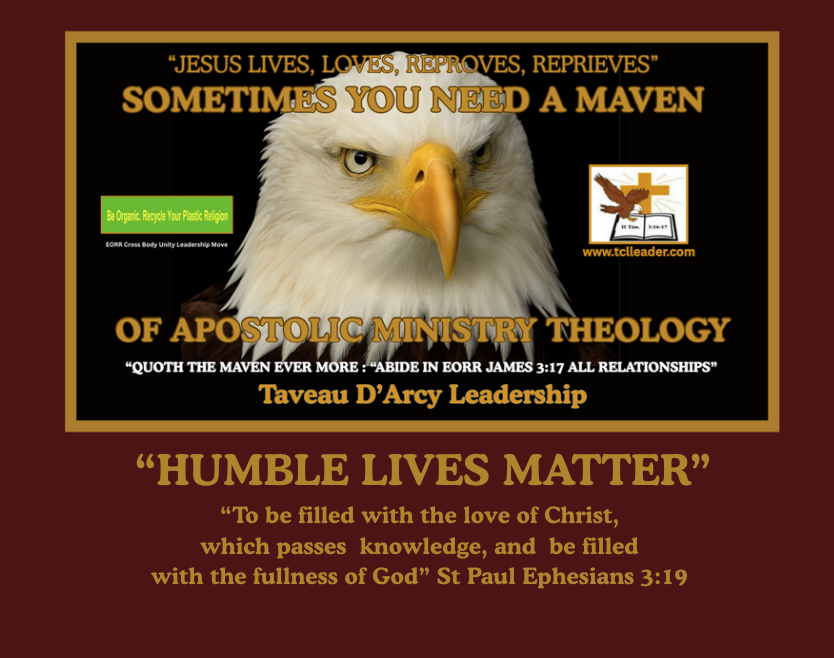
Motives and Mind Games in “Quasi Christian” Ministry, Business and Family: The Depleting, Untrue, and Manipulative Cycle
In many ministry contexts, especially in the last days, we see the emergence of mind games that deplete and weary the hearts of believers. These games are rooted in false authority and counterfeit spiritual power—akin to the dark drama that surrounds ministries where gossip, manipulation, and indirect attacks are common. This creates a toxic environment where real relationships are avoided, and instead of reconciliation, there is a trade in false readings and untrue reports.
Such practices often manifest in forms of passive control or spiritual manipulation, and they can take on a “Wiccan” or occult-like form. These ministries use false power to exert big boss control over others. The leader’s authority is built on manipulation, fear, and emotional tactics rather than the humble, loving submission that the Bible prescribes for leadership. This behavior isn’t just a weak flaw—it’s a counterfeit spiritual power that acts like a subtle form of witchcraft, using spiritual manipulation and emotional intimidation to control others.
Avoiding Real Relationship: The Subtle Destruction of True Fellowship
This deceptive practice involves avoiding direct confrontation or one-on-one conversations, which are essential to walking in the light as 1 John 1:7 instructs. Real relationships require openness, truth, and vulnerability. However, these mind games create an environment where leaders refuse to meet face to face and hide behind indirect attacks, gossip, and spiritualized language to manipulate others.
When leaders refuse to submit to one-on-one, private reconciliation as prescribed in Galatians 6:1 and Matthew 18:15-16, it opens the door to deeper, more insidious forms of control. The spiritual climate in such ministries is often marked by shifting atmospheres, where you feel the tension of waiting for the other shoe to drop—just like someone in an abusive relationship. The power dynamics are intangible but deeply felt, and like domestic abuse, the emotional manipulation cycles repeat, making the believer feel uncertain and unsafe

EMOTIONAL DISHONESTY
Character White Witchcraft in Ministry, Family, Lay and Life
A Call to Genuine Leadership in Christ
The State of Ministry Today
“Rebellion is as the sin of witchcraft, stubbornness is as the sin of iniquity and idolatry” I Samuel 15:23
WICCAN “like the word WICKER WOOD” twisted,out of natural order, many potions are added, then pressure is applied to force the natural wood to conform to one human person’s desired shape.
“I will also clothe her priests with salvation: and her saints shall shout aloud for joy.”
Psalm 132:16
(C)2025 Taveau D’Arcy All copyrights reserved under international copyright laws

.
3 NOW VERSES:
1 John 1:7 (KJV):
“But if we walk in the light, as he is in the light, we have fellowship one with another, and the blood of Jesus Christ his Son cleanseth us from all sin.”
Psalm 132:9 (KJV):
“Let thy priests be clothed with righteousness; and let thy saints shout for joy.”
Psalm 132:16 — “I will also clothe her priests with salvation: and her saints shall shout aloud for joy.”
James 3:17 (KJV):
“But the wisdom that is from above is first pure, then peaceable, gentle, and easy to be intreated, full of mercy and good fruits, without partiality, and without hypocrisy.”
Ephesians 3:19 (KJV):
“And to know the love of Christ, which passeth knowledge, that ye might be filled with all the fullness of God.”
There is a dangerous and often unnoticed craft growing in the heart of Christian ministry—one that cloaks itself in spiritual language and outward righteousness but is ultimately rooted in emotional dishonesty. This emotional dishonesty is not a surface-level issue; it runs deep, affecting leaders, congregations, and the very integrity of the church. It is a craft where leaders, often unwittingly, create environments of manipulation, avoidance, favoritism, and control. These are not the marks of a servant-leader but of one who is caught in a spiritual performance, masking the truth for the sake of image, reputation, or power.
As pastors, ministers, and leaders, we are called to walk in the light (I John 1:7)—to live in truth, humility, and transparency. However, many have become accustomed to hiding behind titles, appearances, and the guise of spiritual maturity, while at the same time practicing avoidance, blame-shifting, and unbiblical control. This is not the heart of Christ, and it is far from the example set by the early church leaders.
A Call to Confront Emotional Dishonesty
It’s time for us to ask: How have we allowed these subtle, toxic patterns of emotional dishonesty to creep into our ministries? How have we, as shepherds of God’s flock, become so focused on image that we’ve neglected true Christlike humility and genuine care for the people we serve?
If we are to shepherd after God’s own heart, we must first confront these areas within ourselves that have allowed these unhealthy, emotional dynamics to shape how we lead and interact with others. This is not just about fixing a few surface issues; this is about re-aligning with the heart of Christ—the humble, self-sacrificing servant-leader who went to the cross for all people, regardless of status, title, or importance.
From Here: Challenge, Teach, Heal
Now that the foundation is set, you can launch into the various sections that explain the root causes (like Adam’s avoidance), the biblical teachings (Psalm 132, James 3:17, 1 John 1:7), and the real-life examples of leadership failure (e.g., the “poor me” spirit and unaccountable behavior). The opening should call leaders to introspection and challenge them to reflect on the deeper spiritual implications of their leadership style and how it impacts the congregation.
1 John 1:7 (KJV):
“But if we walk in the light, as he is in the light, we have fellowship one with another, and the blood of Jesus Christ his Son cleanseth us from all sin.”
Psalm 132:9 (KJV):
“Let thy priests be clothed with righteousness; and let thy saints shout for joy.”
Psalm 132:16 — “I will also clothe her priests with salvation: and her saints shall shout aloud for joy.”
James 3:17 (KJV):
“But the wisdom that is from above is first pure, then peaceable, gentle, and easy to be intreated, full of mercy and good fruits, without partiality, and without hypocrisy.”
Ephesians 3:19 (KJV):
“And to know the love of Christ, which passeth knowledge, that ye might be filled with all the fullness of God.”

Emotional Dishonesty as Ministry Craft: A Call to Return to the Light
Introduction
In every generation of the church, leaders face the temptation to substitute appearances for reality, image for truth, and position for character. What Scripture calls walking in the light (1 John 1:7) can be quietly replaced with crafted patterns of avoidance, blame-shifting, favoritism, and manipulation. This is what we might call emotional dishonesty as Christian/ministry craft: a counterfeit system of relating that looks spiritual but operates in hidden darkness.
The psalmist prayed:
“Let thy priests be clothed with righteousness; and let thy saints shout for joy… I will also clothe her priests with salvation: and her saints shall shout aloud for joy.” (Psalm 132:9, 16 KJV)
When priests, pastors, and overseers live in truth and integrity, God’s people rejoice. But when leaders walk in emotional dishonesty, cloaked in spiritual craft, the result is confusion, mistrust, and spiritual damage to the grass roots believers. What follows is both a diagnosis and a call to repentance for leaders who desire to shepherd as Christ shepherded.
1. The Root: Adam’s Avoidance in the Garden
In Genesis 3, Adam hid from God, then shifted blame onto Eve:
-
Avoidance: “I was afraid… and I hid myself” (v. 10).
-
Blame-shifting: “The woman whom thou gavest to be with me…” (v. 12).
This is the first act of emotional dishonesty—ducking responsibility before God, projecting guilt onto another, and breaking fellowship. When leaders avoid facing truth, they repeat Adam’s pattern: refusing to own their failings, while deflecting onto others
2. False Fellowship: Reading Without Relating
In many ministries today, people are read but never related to. Leaders or peers size up a person spiritually, “discern” them from afar, and then report suspicions—yet never sit across the table in conversation.
This violates 1 John 1:7:
“But if (when/as) we walk in the light, as he is in the light, we have fellowship one with another, and the blood of Christ cleanses us from all sin” (For this “to be cleansed of sin by Jesus blood) is a conditional upon Christian behavior/character)
True Top Minister “walking in the light” produces fellowship, not secret divining, surveillance, or avoidance. To “walk in the light” is to risk honest, face-to-face relationship, not hide behind reports, whispers, or impressions.
3. Anti-Gospel Valuing vs. Clique Elitism
Some ministries operate like caste systems: elites are celebrated, while “lesser” voices (women, outsiders, non-ordained, or poor) are sidelined. Yet the gospel declares:
“…he hath made us (EACH) accepted in the beloved.” (Ephesians 1:6 KJV)
Every believer—regardless of title, gender, or social standing—is equally valued in Christ. To favor only the powerful or insiders is anti-gospel (The Good News of Christ) advertising. It paints a distorted picture of Jesus, who welcomed fishermen, tax collectors, children, and women alongside rulers and rabbis. (therefore it might be ANTI CHRIST)
4. Wisdom From Above vs. Accusing Partiality
James contrasts earthly “wisdom” with wisdom from above:
“But the wisdom that is from above is first pure, then peaceable, gentle, and easy to be intreated, full of mercy and good fruits, without partiality, and without hypocrisy.” (James 3:17 KJV)
Where there is partiality, accusation, or stereotyping, there is not the Spirit’s wisdom but a counterfeit. Accusing from afar is emotional dishonesty disguised as discernment. It breaks peace, sows distrust, and denies the purity of Christ’s Spirit.
5. God Is No Respecter of Persons
Peter’s breakthrough in Acts 10 stands as a permanent correction:
“Of a truth I perceive that God is no respecter of persons: But in every nation he that feareth him, and worketh righteousness, is accepted with him.” (Acts 10:34-35 KJV)
God does not mingle faith with favoritism. To respect persons is to contradict His nature. Any ministry that prefers males over females, elites over common believers, or insiders over seekers, is violating the impartiality of the gospel.
6. False Witness, Tale-Bearing, and Rumoring
False witness often disguises itself as “concern.” Yet Scripture is clear:
-
“Thou shalt not raise a false report…” (Exodus 23:1)
-
“A false witness that speaketh lies… the Lord doth hate” (Proverbs 6:19).
Rumors, half-truths, and whispers become tools of emotional dishonesty. Instead of Galatians 6:1 restoration and Matthew 18:15 conversation, they destroy reputations and trust. This is not pastoral care but emotional craft.
7. When Emotional Dishonesty Becomes Witchcraft
Paul warned that the works of the flesh include “witchcraft” (Galatians 5:20). Emotional dishonesty becomes subliminal witchcraft when leaders:
-
Use authority to control or shame.
-
Pray against people instead of for them.
-
Manipulate through fear, silence, or withdrawal.
-
Intimidate by spiritualizing their bias.
Such practices may wear a Christian face, but they mirror occult control: domination, manipulation, and intimidation.
Jesus warned in Matthew 7:21-23 that many will minister in His name yet be denied entrance because they practiced lawlessness. False authority and emotional dishonesty fall squarely into this danger zone.
8. The Effect on Grassroots Congregations
Psalm 132 paints the picture: when priests (leaders) are clothed in righteousness, the people rejoice. But when priests are clothed in manipulation or dishonesty, the saints mourn in silence.
-
Character of the priest shapes the spirit of the people.
-
Fruit of leadership ripples through every congregation member.
-
Tone of the overseer either liberates saints to shout with joy or drives them into fear, silence, and mistrust.
The grass roots do not live on sermons alone. They live under the emotional, spiritual, and relational climate that leaders create. That climate must reflect Christ.
9. Personal Reflection: The “Poor Me” Spirit in Leadership
I have witnessed firsthand how some pastors, especially those who carry a poverty spirit or have a “poor me” mindset, project their inner struggles onto their congregation. These leaders blame the people for their own feelings of discontentment, complaints, or church departures. They act like it’s the congregation’s fault when there’s unhappiness, but when you look closer, you see a deeper issue.
I’ve watched one such pastor—who was a “chief apostle” of a ministry that didn’t even have 150 members—go behind people’s backs, have favorites, and perpetuate a “Gates in the City” mentality, yet remain petty, weak, and immature. The behavior was anything but Christlike. The attitudes were far from James 3:17 wisdom—“pure, peaceable, gentle, and full of mercy”—and were more like manipulation, favoritism, and an unwillingness to grow.
What these pastors need to realize is that their “poor me” attitude is not a servant-leader mentality. It’s an immature, self-centered, and emotionally dishonest posture. They use their struggles to justify not taking responsibility for their leadership behavior. They play the victim instead of modeling Christ’s humility, which says: “The greatest among you shall be your servant.” (Matthew 23:11).
Such an attitude is not fruit of pure wisdom from above but a sign of spiritual immaturity that damages both the individual and the ministry at large.
This is the very behavior we need to challenge in today’s pastors, leaders, and overseers. To truly walk as servant leaders, we must model the selflessness of Christ and lead with pure, peaceable wisdom that reflects James 3:17—a wisdom that does not shift blame, show favoritism, or manipulate people into submission. Rather, we lead by example, humbling ourselves to serve God’s people, not by holding power over them.
10. A Pastoral Pathway to Re-Clothing
-
Publicly re-affirm impartiality (Acts 10:34-35; James 2:1). Name and reject caste/clique culture, male-only honor systems, and respect of persons.
-
Recover light-walking (1 John 1:7): commit to direct, face-to-face reconciliation; end “divining from afar.”
-
Replace control with care: no “praying against” people; pray for them; end shunning/avoidance; restore Galatians 6:1 gentleness.
-
Audit processes: grievance intake, discipline, restoration—all impartial, written, and transparent.
-
Shepherd for joy: measure congregational joy as seriously as attendance. Joy is a theological KPI in Psalm 132.

ED “EMOTIONAL DISHONESTY” A LEADERSHIP CRAFT?
Emotional dishonesty may be called “craft,” but it is not of Christ.
Main TD Point: It damages fellowship, misrepresents the gospel, and mirrors occult control. But the Lord still calls His shepherds back to purity, humility, and truth.
Let the priests be clothed in righteousness. Let the overseers bear fruit in character. Let the saints shout aloud for joy. For when leaders walk in truth and compassion, the church reflects Jesus—not craft, not control, not partiality, but Christ Himself.
Emotional Dishonesty in Ministry: Rooted in the Fall
Emotional dishonesty in ministry often stems from spiritual brokenness and improper handling of emotions. It can manifest as a refusal to face one’s own feelings and responsibility, instead blaming others. This pattern can be traced back to the Garden of Eden, where Adam first demonstrated emotional dishonesty by blaming Eve for their sin (Genesis 3:12). Rather than taking responsibility for his actions before God, Adam deflected the blame.
Key Scriptures to Explore:
-
Genesis 3:12 (Adam’s deflection of responsibility)
“And the man said, The woman whom thou gavest to be with me, she gave me of the tree, and I did eat.”This is the first recorded instance of emotional dishonesty—Adam’s refusal to take personal responsibility and his attempt to deflect blame onto Eve.
Romans 5:12 (The fall of humanity)
“Wherefore, as by one man sin entered into the world, and death by sin; and so death passed upon all men, for that all have sinned:”This verse reflects the entrance of sin and brokenness into the world, showing how Adam’s fall has left a legacy of sinful behavior affecting all humanity.
Ephesians 4:25-32 (A call to honesty and reconciliation)
“Wherefore putting away lying, speak every man truth with his neighbour: for we are members one of another.
Be ye angry, and sin not: let not the sun go down upon your wrath:
Neither give place to the devil.
Let him that stole steal no more: but rather let him labour, working with his hands the thing which is good, that he may have to give to him that needeth.
Let no corrupt communication proceed out of your mouth, but that which is good to the use of edifying, that it may minister grace unto the hearers.
And grieve not the holy Spirit of God, whereby ye are sealed unto the day of redemption.
Let all bitterness, and wrath, and anger, and clamour, and evil speaking be put away from you, with all malice:
And be ye kind one to another, tenderhearted, forgiving one another, even as God for Christ’s sake hath forgiven you.”This passage emphasizes truthfulness, reconciliation, and emotional integrity in relationships. It challenges believers to put away lies, bitterness, anger, and deceit, calling them to walk in honesty, kindness, and forgiveness, mirroring Christ’s love and forgiveness toward us.
These verses are key in understanding the progression from emotional dishonesty (as seen in Adam’s deflection) to the need for truth and reconciliation in our relationships, which is foundational for healthy Christian living.
In ministry, this emotional dishonesty can create environments where people refuse to engage directly and openly with one another. Instead of being forthright, individuals might avoid confrontations or manipulate situations to protect their own image or agenda. This behavior, while often subtle, can permeate the ministry and create toxic dynamics of avoidance and deceit
Ministry Dark Intrusions
Far-Off Deep Scanning (“Prophetic”Inner Reading) Divining, and Reporting Without Respect (I John 1:7)
In many, mostly tongue talking, Christian circles, some individuals may engage in practices of “far-off reading” or divination, where they claim to know or discern someone’s spiritual state or intentions without ever having a conversation or building a relationship. This can create a climate of fear, suspicion, and judgment, particularly if individuals are reported to leaders without direct dialogue.
Key Scriptures to Consider:
-
I John 1:7: “But if we walk in the light, as he is in the light, we have fellowship with one another, and the blood of Jesus his Son cleanses us from all sin.” This passage emphasizes the importance of walking in honesty and truth with others, and not engaging in secretive, unspoken judgment.
-
The Protocol of the First Church: Valuing and Respecting One Another
In the First Church, respect and honor were fundamental in relationships and ministry. The early believers understood that personal value and mutual respect were central to living out the teachings of Christ. This is a protocol of ministry leadership: valuing one another regardless of status, title, or social position, and always dealing with others in a way that reflects the heart of God.
The protocol of the First Church was not about title-wielding authority or social hierarchy. It was about servant leadership, compassion, and restoration, based on mutual respect and dignity for every individual in the body of Christ. Leaders were called to serve and not to dominate. The New Testament scriptures outline how to correct and confront fellow believers—especially leaders—when necessary, always doing so with grace, humility, and in private, without causing unnecessary harm to the person’s reputation or standing.
Galatians 6:1 (KJV):
“Brethren, if a man be overtaken in a fault, ye which are spiritual, restore such an one in the spirit of meekness; considering thyself, lest thou also be tempted.”
In Galatians 6:1, Paul gives a clear and compassionate protocol for confrontation:
-
Privately: The goal of confrontation is restoration, not public exposure or shame.
-
In a spirit of meekness: Even when correcting others, we must approach them humbly, recognizing our own vulnerability to sin.
-
Considering ourselves: When we see someone struggling, we must approach them with the understanding that we too could fall into similar temptations, therefore, exercising gentleness and grace.
In contrast to the emotional dishonesty or unbiblical authority that exists in some modern ministry systems, the First Church emphasized reconciliation and restoration, always practicing the principle found in Galatians 6:1. This approach not only values the individual but also protects the integrity of the body of Christ.
The protocol for correction in the First Church was deeply rooted in personal responsibility and restorative relationships. It didn’t involve passive-aggressiveness, gossip, or “inner readings” from a distance, but rather direct, compassionate engagement, aiming for the spiritual health and maturity of all involved.
-
-
Matthew 18:15-17 (Jesus’ instructions for addressing issues with others)
“Moreover if thy brother shall trespass against thee, go and tell him his fault between thee and him alone: if he shall hear thee, thou hast gained thy brother.
But if he will not hear thee, then take with thee one or two more, that in the mouth of two or three witnesses every word may be established.
And if he shall neglect to hear them, tell it unto the church: but if he neglect to hear the church, let him be unto thee as an heathen man and a publican.” -
This passage provides a biblical framework for reconciliation: start with a private conversation, escalate only when necessary, and finally, involve the church community if the issue remains unresolved. It underscores the importance of personal responsibility, private accountability, and community involvement in conflict resolution.
- This verse emphasizes the need for humility and meekness when restoring someone who has fallen into sin or error. It also serves as a reminder to consider your own weaknesses before approaching others, ensuring that any correction is done with a spirit of gentleness and self-awareness.
Engaging in these practices without the respect and openness encouraged by I John 1:7 and Matthew 18:15-17 is a form of spiritual dishonesty that tears down relationships rather than building them up. It violates the biblical call to speak truthfully, resolve conflict with compassion, and uphold justice in a community.

Mature Confrontation : A Biblical First Church Command, Modern Protocol
Respect and Genuinely Love to Privately, Calmly Maturely Confront) with Genuine Jesus Humble Compassion)
In every church, there’s an unspoken tension between what is projected from the pulpit and what’s felt in the pews. It is the difference between what we say we believe and how we live it out day by day. This is where the practice of emotional dishonesty begins—a subtle yet powerful force that causes leaders to walk in half-truths, self-protection, and even manipulation under the guise of spirituality. As shepherds, we are called to shepherd with authenticity, love, and humility, not image or agenda. It’s time to take a hard look at how emotional dishonesty may have crept into our leadership and our ministry culture, and how we can reclaim the purity of Christlike leadership
The early church understood that (other person RESPECT) included no desire to control, no untrustworthy gossip, “believing a rumor or an evil report’ when compared to “Bible first Church “confrontation and correction “were essential parts of healthy ministry, but they were always done with a spirit of humility, restoration, and respect. As ministers, we are called to restore, not to condemn, to love, not to accuse, and to reconcile, not to divide.
Basic Lessons In Biblical Protocol for Confrontation: Galatians 6:1
Paul’s words in Galatians 6:1 provide a clear and compassionate protocol for correction:
“Brethren, if a man be overtaken in a fault, ye which are spiritual, restore such an one in the spirit of meekness; considering thyself, lest thou also be tempted.” (Galatians 6:1, KJV)
Key Aspects of the Protocol for Healthy Confrontation:
1. Correct in Private First (Matthew 18:15)
The First Church followed the principle of addressing issues privately before they escalated. This is the protocol outlined in Matthew 18:15:
“Moreover if thy brother shall trespass against thee, go and tell him his fault between thee and him alone: if he shall hear thee, thou hast gained thy brother.”
Practical Step:
-
Initiate a private conversation with the individual. Whether it’s a fellow minister or a congregant, don’t address conflicts publicly or indirectly (through gossip or public rebuke).
-
Be clear about the issue at hand. Focus on behavior, not character, and speak with an open heart for restoration, not condemnation.
2. In a Spirit of Meekness
Paul emphasizes a spirit of meekness—which is humility and gentleness. Leaders should confront with grace, not with a harsh or demanding spirit.
Practical Step:
-
When confronting someone, check your heart and attitude before you engage. Ask yourself: Am I motivated by a desire for their restoration, or do I want to prove I’m right?
-
Use gentle language and tone. Remember, the goal is to restore the individual, not to put them down.
-
Do not lord your authority over them. A gentle, loving correction is far more effective than authoritative, harsh commands.
3. Considering Yourself
Before confronting anyone, Paul reminds us that we must consider our own weaknesses and the possibility that we could fall into the same temptation. Confrontation should never come from a position of superiority or judgmentalism but from a place of empathy and understanding.
Practical Step:
-
Examine your own heart before addressing another. Consider if you’ve struggled with similar issues or temptations.
-
Use language that acknowledges your own vulnerability, such as: “I know I’ve struggled in this area too, but I want to talk about how we can grow together…”
-
Be transparent about your own mistakes when appropriate, showing that correction is a part of everyone’s journey, including yours.
4. Restore, Don’t Condemn
The goal of confrontation in the First Church was always restoration. Restoration means bringing the person back into alignment with God’s Word, helping them heal, and guiding them to become more like Christ.
Practical Step:
-
Offer support: After addressing the issue, give the individual tools and encouragement to overcome. Don’t just leave them with the correction; come alongside them to help them grow.
-
Follow up: Restoration is not a one-time conversation. Check in with the person afterward to see how they are doing and to offer continued support.
5. Be Gentle and Full of Mercy (James 3:17)
James outlines that the wisdom from above is not just pure, but also peaceable, gentle, and full of mercy. Our correction must come with mercy—an understanding that everyone falls short and needs God’s grace.
Practical Step:
-
Focus on the individual’s potential for growth, not just their fault. When you correct, highlight the opportunity for them to become better, to grow spiritually, and to be more effective in their walk with Christ.
-
Emphasize God’s grace: Remind them that their mistake does not define their identity. Help them understand the redemptive power of the gospel that forgives, restores, and transforms.
6. Protect Their Reputation (1 Peter 4:8)
The First Church understood the importance of protecting one another’s reputation, especially when confronting or correcting. Private confrontation protects the person from public humiliation and allows for a path to restoration without shame.
Practical Step:
-
Always confront in private to protect their dignity. This allows for a safe space where the person can be vulnerable and where the correction can be made without fear of public backlash.
-
If the person has made a public mistake, restore them publicly once they’ve genuinely repented or made amends, so they are not left in disgrace (Luke 15:7).
7. Be Steadfast and Patient
Restoration is a process, not a quick fix. Sometimes people need time to change, and patience is key in the confrontation and correction process.
Practical Step:
-
Be prepared for the long haul. Change takes time, and we must have the patience to walk alongside someone as they make progress.
-
If they stumble again, extend grace and encourage them to keep moving forward, showing them that growth is a journey.

Why This “Each Relationship Respect’ More Humble Ministry Approach Works
This biblical approach to confrontation ensures that correction is done with the goal of restoring fellowship, growth, and maturity in Christ. It removes the destructive forces of emotional dishonesty, favoritism, gossip, and manipulation from our leadership practices. When we confront in love, we help the person grow, and when we do so publicly with humility, the entire church benefits by being a place of safe, healing relationships.
By embracing the protocol of the First Church, we will cultivate an environment of honor, humility, and restoration in our ministries. Our approach to confrontation will mirror Christ’s heart, leading people into a deeper walk with Him and a stronger, healthier body of believers
Why This Approach Works
This biblical approach to confrontation ensures that correction is done with the goal of restoring fellowship, growth, and maturity in Christ. It removes the destructive forces of emotional dishonesty, favoritism, gossip, and manipulation from our leadership practices. When we confront in love, we help the person grow, and when we do so publicly with humility, the entire church benefits by being a place of safe, healing relationships.
By embracing the protocol of the First Church, we will cultivate an environment of honor, humility, and restoration in our ministries. Our approach to confrontation will mirror Christ’s heart, leading people into a deeper walk with Him and a stronger, healthier body of believers.

Avoidant Entitled, Elite, On the Go, Busy Blame Shifting & (Immune, Self Absorbed, usually Haughty) Ministry Narcissism
Avoidant blame shifting, often coupled with narcissistic tendencies, can be a common problem in toxic ministry settings. When leaders or members refuse to take responsibility for their actions, they deflect, accuse others, and protect their ego at all costs. This can create a ministry environment that breeds distrust and spiritual manipulation.
Key Scriptures to Address:
-
Revelation 12:11: “And they have conquered him by the blood of the Lamb and by the word of their testimony, for they loved not their lives even unto death.” This highlights the victory of truth over the enemy, calling believers to confront lies and manipulative behavior.
-
James 4:6-10: God opposes the proud but gives grace to the humble. This speaks to the importance of humility and self-reflection, as opposed to narcissistic pride.
-
Romans 1:18-32: Paul describes people who suppress the truth in unrighteousness, leading to destructive behaviors, including blame-shifting and narcissistic tendencies.
Ministry leaders should be careful not to adopt these behaviors, as they create divisions and perpetuate a culture of dishonesty, which eventually leads to spiritual decay

Untrustworthy TOP LEADERS, STAFF, LAY
False Witness, Tale-Bearing, and Rumoring
“WORD CURSE LEADERS” Nick Name “The Back Whisperers”
(Note: This breeds Apostle Paul’s last days big warning to ‘get out of that church!” (2 Timothy 3:1-8, I Timothy 6:5)
False witness and tale-bearing among servant leaders, lay, top high mega ministry offices are serious sins that cause division in the body of Christ. These practices often stem from emotional dishonesty, self-interest, and a lack of accountability. When rumors are spread, especially without the goal of reconciliation or understanding, they damage the integrity of individuals and ministries.
Key Scriptures to Address:
-
Proverbs 6:16-19: “There are six things the Lord hates, seven that are detestable to him: …a false witness who pours out lies…” These actions are directly condemned in Scripture.
-
Exodus 23:1-2: “Do not spread false reports. Do not help a wicked man by being a malicious witness.” This addresses the responsibility of the believer to guard against false testimony.
-
1 Timothy 5:19-20: Instructions on how to deal with accusations against church leaders, emphasizing the need for two or three witnesses.
False witness can be likened to gossip and tale-bearing, both of which cause strife, confusion, and division. These actions run counter to God’s call to live in peace and truth
False Authority: Emotional Witchcraft, and Occult Practices
When false authority is exerted over others, it often leads to the manipulation and control of individuals. This is especially dangerous in ministry, where people are more vulnerable to spiritual manipulation. Using false authority in ministry can be equated to witchcraft, as it involves the attempt to control and dominate others in ways that are not aligned with God’s purposes.
Key Scriptures to Address:
-
Matthew 7:21-23: Jesus warns against false prophets who use their authority to deceive others. “Not everyone who says to me, ‘Lord, Lord,’ will enter the kingdom of heaven…” This is a stern warning to those who manipulate others in the name of Christ.
-
Galatians 5:19-21: The works of the flesh, including witchcraft and idolatry, are contrasted with the fruit of the Spirit. The use of false authority often results in toxic ministry practices that resemble witchcraft in their control over others.
-
Revelation 18:23: “For your merchants were the great ones of the earth, and all nations were deceived by your sorcery.” This illustrates the destructive nature of sorcery and manipulation, especially in spiritual matters.
When individuals use their spiritual position to manipulate or control others, they are practicing a form of witchcraft that is condemned in Scripture. These practices are not only harmful to the individuals involved, but they also threaten the integrity of the ministry as a whole.
The Eternal Consequences: Will These Leaders Be Left Out of Heaven?
In light of Matthew 7:21-23, Jesus warns that some who claim to act in His name will be turned away on the final day. Those who use spiritual authority for manipulation and control, without truly honoring God’s will, risk eternal separation from Him. This serves as a stark warning to all who serve in ministry positions.
Key Scriptures to Address:
-
Matthew 7:21-23: “Not everyone who says to me, ‘Lord, Lord,’ will enter the kingdom of heaven, but only the one who does the will of my Father who is in heaven.” Jesus warns against false religious leaders who are spiritually dishonest.
-
Hebrews 10:26-31: “If we deliberately keep on sinning after we have received the knowledge of the truth, no sacrifice for sins is left, but only a fearful expectation of judgment…” This passage emphasizes the gravity of living in unrepentant sin, especially in spiritual leadership.
Application Today: How to Overcome These Issues in Ministry
Today, many churches and ministries still grapple with the toxic behaviors mentioned above. However, overcoming these issues is possible through a return to biblical principles of humility, truth, and reconciliation.
Steps for Overcoming These Issues:
-
Personal Accountability: Embrace honesty, transparency, and accountability within ministry teams.
-
Conflict Resolution: Follow biblical steps for conflict resolution (Matthew 18:15-17) and avoid gossip and false witness.
-
Guard Against Manipulation: Recognize and resist any form of spiritual manipulation or false authority that seeks to control people for selfish gain.
-
Cultivate Humility: Leaders should model humility, seeking to serve rather than dominate others (Philippians 2:3-4).
By fostering environments of truth, humility, and grace, ministries can overcome these issues and honor God in all their dealings with others.
Controlling VS Being “Of One Mind” Up Front
(C)2025 Taveau D’Arcy All copyrights reserved under international copyright laws in conjunction with AI


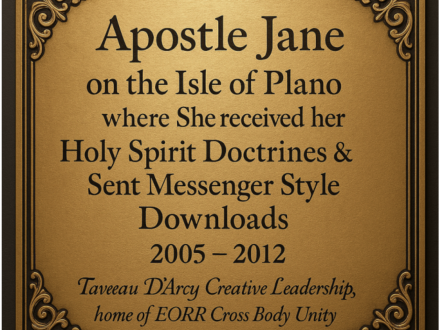








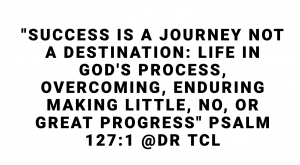













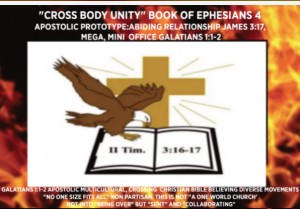




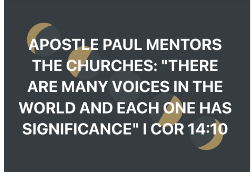

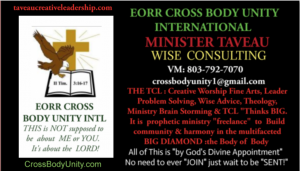















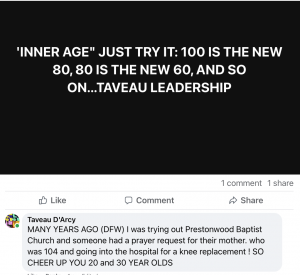




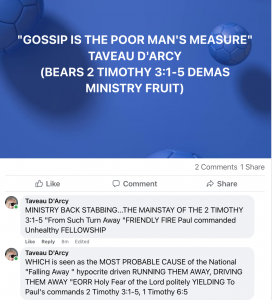


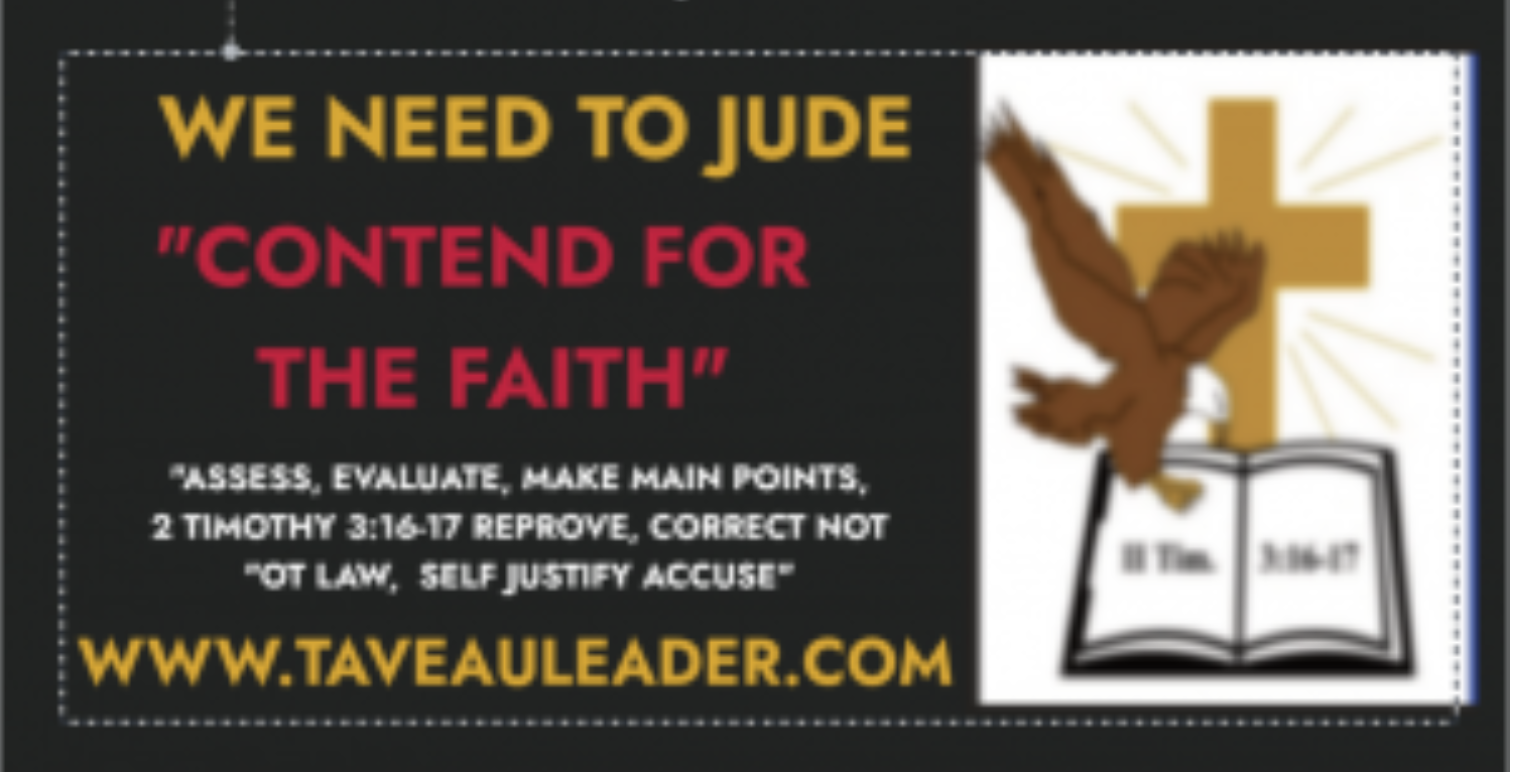
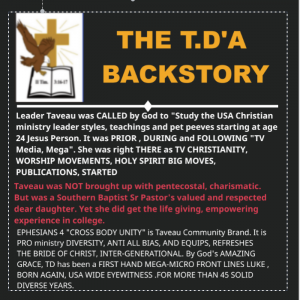



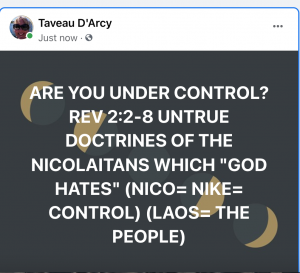
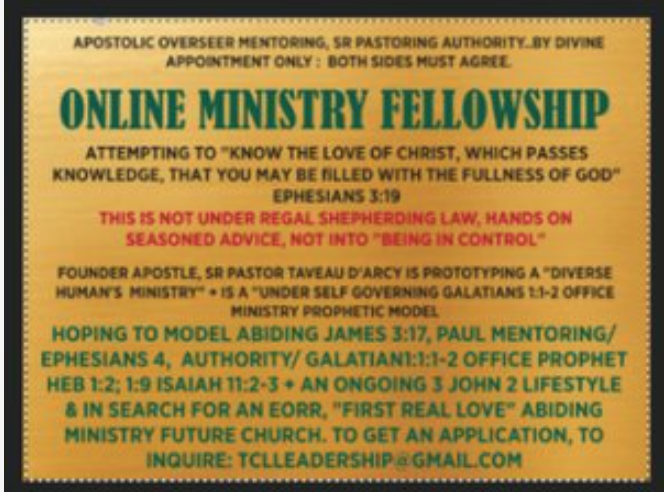


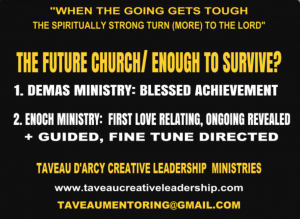















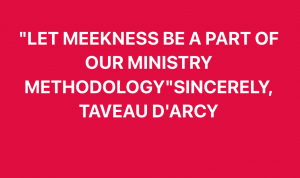






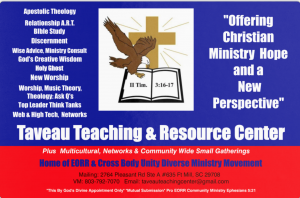






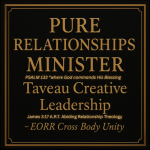







Recent Comments